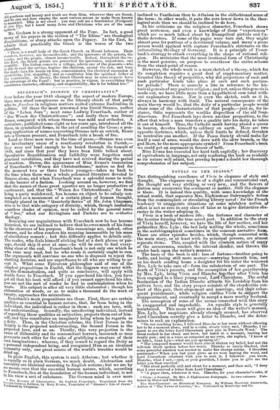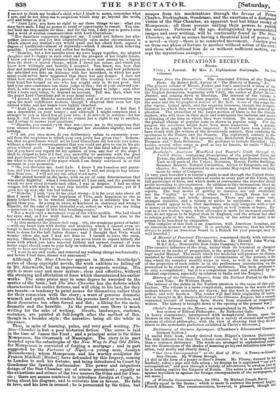IrOTELE OF THE SEASON.
historical, we are inclined to believe that heowes much of his fame of 'trivia herself, however, we have the life of her mcither, and her to the clearness of .his purpose. His reasonings are, indeed, often g,odutother Mrs. Lyle ; the last lady writing the whole, sometime* obscure, and he often renders his meaning inaccessible by his mass in the autobiographical sometimes in the common narrative for of elucidatory remark ; but this difficulty applies to details only. There are other episodes besides, which, though connected with. The reader, who feels himself sticking fast at a dark phrase or pas- the main story, or at least with its principal persees, are alemee sage, should skip it over at once—he will be sure to find every,. separate items. 'This, coupled with the cotarnon nature of namay thing dear at the end. Feuerbaeh's book is not only one which fte of the occurrence; renders the interest', slender, and throws_ the The arguments ik.ill convince no one who is disposed to reject the The basis of the book is old : loss of fortune—brother going to startling doctrine, and are superfluous to all who are willing to ac- India; and loeine° still mote money—maerying beneath him,. end cept it. What some Epicurean philosopher said of one of the on his death sending 'borne a daughter for his sister the widowed simplest propositions in Euclid, that the diagram was easier with- Mrs. Lyle to take can of—form the substratum of one part. The out the demonstreeloue and quite as conclusive,. will apply with death of Vivia's parents, and the asiumption of her guardianship double force to Feuerbach. If you apprehend hia idea, you have by Mrs. Lyle, bring Viyia and Illenche,,tOsether after Thin has got all that his book will afford • if you cannot apprehend his idea, been engaged to a blase young roue, Lord Clarenham. The artful you are not the sort of reader Le had in contemplation when he fascination of the Indian Blanche attracts his Lordship from his wrote. His subject is after all very little elaborated ; though his pattern love, and the story proper consists of the clandestine con- elaboration of words, so as to make a thousand do the work of duct of this pair, their elopement and marriage,' and their subse- ' that I ever received a letter from Lord Clarenham! THE distinguishing excellence of Viria is elegance of style and thought. 1 he elegance may be of a slight and conventional cast, the thought not very striking, or very new, and the flowers of dietien may overpower the,sentunent or. matter. Still the elegence being a party watchword,, has become an object to be calmly con- is there. It is indeed this quality, with mine knowledge of the templated as a monument of a certain phase of human thought, actual world, that separates Mre. Elphiestone Dalrymple 's fietiOR fittingly placed in the 4‘ Quarterly Series" of Mr. John Chapman, from the commonplace or circulating library novel : for the French who is to that wide category of divinitee which, though intlieding tendency to exaggerate situations on some mistaken notion ei effect is not so rare in any class of tales as to give distinctive cha- racter to the writer adopting it.
Vivia is a book of modern life ; the fortunes and character of the heroine forming the true novel part. In addition to the Amy
tell-tale blush spoken before her words. Blanche so mrely blushed, that
am not to think my brother's child what I blush to name, remember what I saw, and do not force me to suspicions which may go.. beyond the truth, evil and bitter as it is.'
'" Aunt Lyle, ,you have no right to say these things tome: what you may have seen, I had no power to avoid or opportunity to resent. You can- not hold me responsible for that; -and for the rest, I defy you to prove I ever had a word of written communication with Lord Clarenham.'
"Her dauntless composure staggered me. I could not believe her alto- gether innocent, and yet this Imperturbable calm under circumstances in which almost any woman's eye would quail and her cheek flush, argued a degree of hardihood—almost of depravity—which I shrank from believing possible. I resolved to try and soften her feelings.
Blanche, but a few months since we were happy together, my adopted daughter and I—happy in each other and the prospect of her bright future. I knew not even of your existence when you were sent among us, a legacy from the dead—a sacred charge, which I dared not refuse, and which you know how willingly and heartily I accepted. You know, too, how that dear and innocent girl took you to her bosom as a sister, and how guilelessly she admitted you into an intimacy with her betrothed, in which her pure mind could never have suggested that there was any danger. I dare not think how unworthy you have proved of this trusting love—of the misery your hand has heaped on one who has sought only to do you good. Goa and your own conscience can alone judge of this ; but of your outward con- duct, I, who am in place of a parent to you, sin bound to judge ; and, after what I have seen today, to demand an account. Tell me, then, what was the paper Lord Clarenham put in your hand today.'
"I paused; and Blanche answered slowly, and as if our conversation was upon the most indifferent matters, though I observed that even her lips turned white, and her hands were tightly clenched. "'Aunt Lyle, you need not remind me of all I owe you. I feel that I -am a dependent on your bounty ; and although I might complain that a stranger to you in blood has all your love, I do not—it is natural—let her keep it : but there are things that no woman has a right to say to another, and I refuse to answer your questions.' "'Blanche you cannot—you dare not—leave ins to the suspicions that ' your silence forces on me.' She shrugged her shoulders slightly, but said nothing.
" ask you once more, do you deliberately refuse to exonerate your- self from the suspicions to which your own levity has given rise ? Remem- ber, that no gentleman would act as Lord Clarenham did towards you today, without a degree of encouragement that you could not give to one in his po- sition without guilt. You only can tell how far this fatal affair has gone ; but if you have any regard for my opinion of you, any fear of the steps I shall be obliged to take if I find you unworthy to associate with the good and pure-hearted Vivia, you will at least offer me some explanation, and tell 'me what is the nature of the paper which I am firmly convinced is at this moment in your possession.'
"'So, you threaten me, Aunt Lyle. I know I am homeless and penni- less, and you have much in your power ; but I will not stoop to buy tolera- tion from you. I will not say one other word more.'
"She seated herself as she spoke, with an air of calm determination that was really frightful: when I remembered all I had said, and the position in which we now stood towards each other, I was in despair. I had no other weapon left with which to meet this terrible passive resistance ; yet if I .gave her up now, she was lost indeed.
"'Blanche,' I said, you do use cruel wrong—it is for your sake above all that I speak : I believe the happiness of Vivia, such happiness as she so _lately looked for, to be wrecked already ; but she is infinitely leas to be pitied than you. So young in years, so hardened in obstinacy and wrong— 'Blanche, for the sake of your immortal soul, reflect on what you are doing —persevere no longer in this fatal headlong course.' "Not a word—not a movement even of the white eyelids. She had closed her eyes, and, as I too truly feared, her ears and her heart also, to the voice of warning and reproof. "At this moment the dinner-bell rang. Oh, the wondrous power of habit I —with my heart torn with doubts and anxieties which I cannot even at- tempt to describe, I could even then remember that it had been settled we were to dress for the ball before dinner ; and I thought that Vivia would wonder when she saw I had not done so. I turned to leave the room, saying, 'Blanche, I have done,—may you never learn to repent bitterly the acorn with which you have rejected faithful and earnest counsel : if your better angel should come to your help on reflection, I shall at all times be ready to hear and forgive you.' "I went to my own room, and removed my walking-things mechanically ; and before I had done, dinner was announced."
Although The Star-Chamber appears in Messrs. Routledge's series of cheap copyright novels, the work exhibits no falling-off in Mr. Ainsworth, but an improvement as regards writing. His style is more easy and more mature; clear and effective, without the straining and affectation of force which characterized his earlier works. The same praise may in some degree be awarded to the matter of the book; but The Star-Chamber has the defects which characterized his earlier fictions, and will cling to his last, for they are innate—a tendency to paint scenes for themselves rather than for their connexion with the story; a want of genuine dramatic warmth and spirit, which renders his persons hard or wooden, and their discourses too often forced and flat; a liking for the melo- dramatic and the horrible. In the present case there is much 'writing for the sake of writing. Streets, landscapes, customs, costumes, are painted at fall-length after the method of Boz, though in a broader style ; the narrative being all the while in abeyance.
Thus, in spite of learning, pains, and very good writing, The Star-Chamber is but a poor historical fiction. The scene is laid in the time of Tames the First ; and a principal actor is Sir Giles Mompesson, the Overreach of Messinger. The story is in part founded upon the catastrophe of the New Way to .Pay Old Debts, for Mompesson is convicted of forging a mortgage ; and in part suggested by the Fortunes of Nigel —a young man Jocelyn Mounchesney, whom Mompesson and his worthy coadjutor Sir Francis Mitchell [Michel] have defrauded by this forgery, coming to London to seek his fortune and being introduced to Court by Gondemar the Spanish Ambassador. The power and iniquitous doings of the Star-Chamber are of course prominent ; equally so the extortions and crimes of the two usurers Sir Giles and Sir Fran- cis; there are scenes contrived to introduce Jocelyn at Court, to bring about his disgrace, and to reinstate him in favour. He falls in love, and his love is crossed ; he is persecuted by Sir Giles, but escapes from his machinations through the favour of Prince Charles, ]3uckingham, Gondemar, and the exertions of a disfigured victim of the Star-Chamber, an apparent tool but bitter enemy of Mompesson ; all these persons uniting their powers to punish the usurers. Pictures of the age, distinguished by accumulated images and easy writing, will be continually found in The Star- Chamber, as well as scenes having a theatrical kind of power. As a novel—a story—there is no connected movement. Jocelyn goes on from one phase of fortune to another without action of his own • and those who befriend him do so without sufficient motive, ex: cept the mysterious avenger.



























 Previous page
Previous page